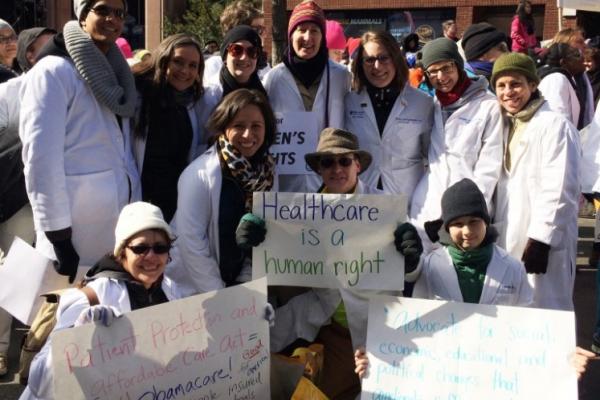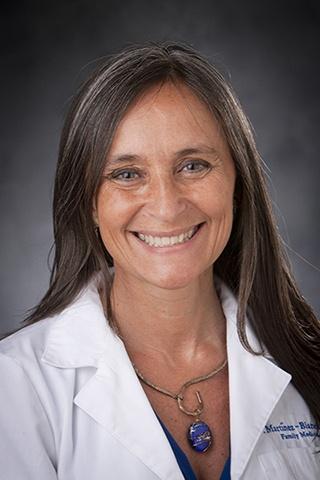
Duke Community & Family Medicine residents, faculty and students at the 10th Annual Moral March on Raleigh.
On Feb. 13, a bitter cold Saturday morning in Raleigh, many members of Duke Community and Family Medicine marched on Fayetteville Street, along with an estimated 5,000 people, in the10th Annual Moral March on Raleigh. The Moral March is a peaceful march that is part of a love and justice movement that proposes:
- Justice in education
- Economic sustainability
- Workers’ rights and livable wages
- Health care For all
- Medicaid expansion
- Love for the environment
- Equal protection under the law, without regard to creed, race, gender, gender identity or sexual orientation
- Voting rights For all
- Criminal lustice
- Protection of the most vulnerable within our state and nation
Since I moved to the Triangle in 2006, I have marched in the Martin Luther King, Jr. Memorial March and the annual Moral March on Raleigh. I love the symbolism of marching with others one step at a time. My eyes well with tears every time I participate: memories and a deep and spiritual sense of the importance of the collective experience rolling through my mind.
March Footage | 2016 Moral March on Raleigh from Eric Preston on Vimeo.

I am reminded of my first march for democracy back when I was a teenager during the Argentinean dictatorship. I am reminded of the struggles of those before us, of the many human rights battles won, the marches and peaceful demonstrations of resistance that have ignited so many changes in the world.
I have usually attended the march with my son, joining the crowd that marches chanting, singing and praying, explaining history to him, translating the meaning of chants to his young inexperience, usually just the two of us and a couple of other friends immersed within the humanity of those who hope and march for a better future. “We shall overcome.”
I march for freedom and democracy and for public policies built with respect to the various identities that live in our country, I march as a symbol to never stand at the side of the road when we see injustice happening around us. I march in the belief that access to health care is a human right. I march in repudiation of offensive and reactionary measures, I march because I worry that anti-rights, political campaigning and fundamentalists are using spaces of power and the mainstream media to proliferate intolerance, and spread prejudice, sexism, misogyny, racism and hatred in society. I march as a woman, as a doctor, as a mother, as an immigrant, as a concerned citizen.
Marching with health care professionals
This year my experience with the march was different. This time I marched with a group of white-coated health care professionals. I was curious to learn about their individual reasons for marching. I wanted to learn the motor and the heart behind our collective experience.
I was touched to see Jessica Friedman, Duke University medical student in the Primary Care Leadership Track and one of the organizers of the Duke gathering for the march, walking in the company of her parents. Her father, William Stephen Friedman, is a 1977 graduate of our Duke Family Medicine Residency Program.
I asked Jessica to share with me her reasons to be there:
“I marched because I believed it was both a necessary part of my medical education and a professional responsibility. As a medical student, I spend much of my time developing clinical expertise, which is both important and necessary: I witnessed the effects of having such expertise when two physician members of our group rushed to the aid of an injured marcher without a moment’s hesitation. But, in the course of training, we witness first-hand how policies both promote and hinder health and well-being, and we do not necessarily develop explicit skills to address these structural and social determinants of health.
“The medical expertise we develop confers upon us both privilege and power in our communities, and I believe it is my responsibility to use that privilege to speak up. Developing my voice as an advocate for my patients and my community is a necessary part of my professional development as a future physician.
“It was certainly cold yesterday, but it was great to be surrounded by a group of people united by a belief that we can, and should, do better in North Carolina. I was most touched by hearing the Republican mayor of Bellhaven, N.C., Adam O’Neal, speak about his fight to maintain a critical access hospital and the NAACP’s support in this endeavor. Especially in an election year, policy can become overly partisan, and I think Mayor O’Neal’s presence was a reminder that love of your community is NOT a partisan issue.”
Duke Family Medicine’s Tiffany Cagle, M.D.; Jonathan Jimenez, M.D.; Everlyn Perez, M.D.; Samuel Fam, DO; Barbara Sheline, M.D., MPH, professor of community and family medicine; and Lorraine Anglin, PA-C, also joined the march.

Tiffany M. Cagle, M.D., third-year family medicine resident, shared her reasons for marching:
“I’ve seen examples of disparities that exist ever since I started meeting people outside my own social group in college, but my recognition of how my privilege impacts me and others has only become apparent to me in the past few years. Along with this realization, I’ve felt an obligation to advocate for a more just world. As I recently shared with some friends, I feel that if I’m not working toward a solution, I’m part of the problem.
“I was very encouraged by the supportive environment at the march. There were many groups there, each advocating for the issue most important to them. However, there was also a sense of shared struggle and a willingness to share the spotlight with others in order to help advance each cause. It gave me hope that we can come together to effect real and lasting change.”
Samuel Fam, DO, first-year family medicine resident, shared:
“I think it was important for legislators to see that though these issues may disproportionately affect lower SES classes, they are issues that all sectors of society should be (and are) concerned with. Moreover, as a physician, I think it is important to capitalize on the platform for advocacy we are given solely through our titles.
“I don’t know what goes on in the minds of the legislators, but, if there was any doubt to the legitimacy of the other advocacy groups, the presence of physicians educated in government accredited health care institutions may lend further legitimacy to their cause. For myself, it was also important to learn from the strength of the other groups marching and to see that these issues they are fighting for are having a significant impact on the community.
“As many of the speakers alluded, though all the groups came to the march with different agendas, the power of uniting together at a single march with one voice emphasizes the need for policy change. The best thing about the march was to hear the voices and stories of the people, to be inspired by their words, and to learn about their causes. It’s important to understand the first-hand experiences of the issues that plague our communities so that we can target interventions and create models of mentorship/pipeline work to raise up the voices of the people.”
Jonathan Jimenez, M.D., said:
“Physicians are committed to our patients’ well being, and that necessarily means a full measure of democracy with high-quality employment, housing, education, and health care. If physicians are not advancing movements for access and quality in all of these, then we are not upholding our oaths.”
Kaitlyn Granda, PA-C, with the Division of Community Health and lead clinician at Walltown Neighborhood Clinic in Durham, attended the march with her 13-year-old son Lewis Joseph and Duke Physician Assistant Program students Paula Wagner and Lucy Angle.
“I march to make a stand for my patients whose voices aren’t heard.
I march because I care for people every day who are scared and despondent because they cannot afford their medications, or to see a specialist because they don’t have money or insurance.
I march for my patients who go to the emergency department because they don’t have the $20 co-pay to see me in clinic, and then they get prescribed medications that they can’t afford.
I march for my mother who marched for civil rights, women’s rights and for the right to choose. She was a ‘raging granny’ and marched locally for the environment, health care and voting rights. She is 83 and finds it difficult to march now.
I march to teach my son to make his voice heard and to stand up for people who can’t or do not know how to speak up for themselves.”
Barbara Sheline, M.D., MPH, professor of community and family medicine, shared:
“It is important for people to see health care providers (white coats) marching in support of important imperatives like expanding Medicaid. The march was well organized and orderly. The speakers were inclusive of Black, Latino, LGTQ issues. The bottom line was clear: get out the vote. I was delighted to be there with a pre-med student, a medical student, residents, fellow faculty and colleagues from the community.”
Howard Eisenson, M.D., medical director of Lincoln Community Health Center, and 1982 graduate of the Duke Family Medicine Residency, was one of the main organizers to get colleagues marching:
“Democratic institutions work best when the voting public is informed and engaged about critical issues, like how to promote and sustain healthy communities. Unfortunately, health professionals both individually and collectively are doing too little to contribute their uniquely valuable perspective to public discourse about those social factors — such as economic well-being, education and environmental quality — that are proven to be so important to determining health. When we fail to be visible, vocal and supportive in addressing these social determinants, we abdicate an important part of our professional responsibility.
“The presence of white coated health professionals at the moral march showed a recognition of our professional responsibility to our patients and our communities. I believe that our presence was also a sign of respect, and a source of encouragement, to others at the march — to concerned North Carolinians who are working to make life better for the most vulnerable of our neighbors. I hope that more and more of us will find our voices, and will stand in support of those who look to us for leadership, for amelioration of human suffering, and for working to help everyone achieve their potential.”
During the march a woman I had never met before approached me and said, “Thank you for being here, it means a lot to us non-medical people to see you all in support of these rights.”
Will you join us next year at the 11th Annual Moral March on Raleigh? With an estimated 35,000 health care workers in the Triangle, shouldn’t we be more than 80 next year marching for healthy communities?
